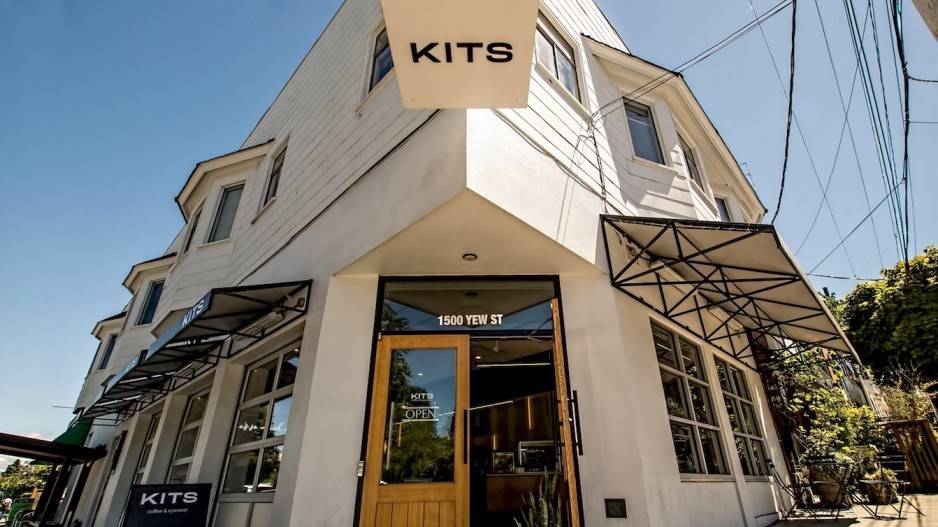Vancouver-based online retailer KITS Eyewear (TSX:KITS) saw sales rise and losses shrink in the three months ended June 30, the company revealed after markets closed August 11.
KITS' revenue increased by less than half of one per cent, to $21.77 million. Revenue may have been higher had the company raised prices to match inflation – something that CEO Roger Hardy told BIV he did not want to do.
He explained that KITS' sales growth was hobbled by the company's decision to encourage contact lens customers to buy glasses.
"Contact lens customers typically spend more on contacts than glasses customers spend on glasses," said Hardy.
"We focused on introducing our contact lens customers to pairs of glasses, which grows our glasses business and lets the customer know they can buy both contacts and glasses."
That move pushed KITS' average order value down, and may have hurt the company's ability to generate future revenue because previously contact-lens-wearing customers were wearing glasses.
KITS lost $923,000 in the quarter, which was a significant improvement from losing $4,858,000 in the same quarter a year ago. The narrowed loss was largely because the company spent less on marketing, Hardy said.
Retail Insider Media owner and retail consultant Craig Patterson questioned KITS' move to not spend more on marketing.
"I'm not sure that KITS is a brand that has huge brand awareness across the country," he said.
He also called KITS "bold" to call itself in press releases "Canada's largest direct-to-consumer eyeglasses manufacturer and digital eyecare provider."
Patterson pointed to privately owned companies, such as Vancouver-based Clearly and Montreal-based BonLook, which likely have higher revenue than does KITS even though those companies do not reveal exact revenue data.
Hardy said his intent of describing KITS in the way that the company does was meant to convey that KITS' sales are almost entirely online – "direct-to-consumer."
The company operates a coffee shop at the corner of Cornwall Ave. and Yew St., where it has some eyewear on display, but eyewear sales at that store are negligible, Hardy said.
KITS' description of itself also drives home that KITS is based in Canada, he said. Hardy has controversially criticized Clearly's claims that it is based in Canada despite being wholly owned by French eyewear giant EssilorLuxottica (EL:FP).
Plenty of online eyewear companies have much more significant Canadian bricks-and-mortar operations than does KITS.
Clearly has seven stores across Canada. Other competitors include BonLook, with 37 Canadian stores, Vancouver-based Ollie Quinn with 16 Canadian stores, and Sydney, Australia-based Bailey Nelson with 36 Canadian stores.
American eyewear giant Warby Parker Inc. (NYSE:WRBY), which also released its earnings yesterday, has four Canadian stores, including a Vancouver location at 2290 West Fourth Avenue.
Warby Parker saw significantly higher revenue growth than did KITS: 13.7 per cent, to US$149.6 million. Given that this amount translates into about $191 million Canadian dollars, Warby Parker is nearly nine times that of KITS.
Unlike KITS, however, Warby Parker saw losses accelerate – to US$32.2 million, up from US$18.8 million in the same quarter a year ago.
Warby Parker announced that had cut 63 jobs, or about two per cent of its global workforce. Investors seemed to like the news as they sent Warby Parker's share price up by more than 19 per cent, to US$16.90.
Hardy's theory for Warby Parker's share price pop was that many investors who had sold the company's shares short were covering their bets. Warby Parker's share price remains down about 63 per cent so far this year even after its jump yesterday.
One analyst told BIV that Warby Parker sent mixed signals.
"While the losses are disappointing, they are somewhat understandable given that the company remains in expansion mode – opening new stores and pushing into new lines of business such as contact lenses," GlobalData managing director Neil Saunders said in an email.
He liked that Warby Parker's sales rose significantly but said he was concerned that its profit margins were shrinking.
Warby Parker also reduced its full-year growth outlook to between eight per cent and 10 per cent, down from between 20 per cent and 22 per cent.
"Not only will this leave a serious hole in the bottom line, but it also suggests that there is a worrying slowdown in demand among consumers," Saunders said.
Hardy agreed. His take on Warby Parker's earnings was that the business is faltering because the company is focusing too much on bricks-and-mortar customers, and not enough on e-commerce.
"I've never seen a human being inside of Warby Parker's store on West Fourth Avenue, other than the people who work there," he said. "I wouldn't want to be in that business."
E-commerce companies have been hurting too, however.
Vancouver-based e-commerce furniture seller Article last week cut 216 jobs – 17 per cent of its workforce. Its CEO Aamir Baig said in a LinkedIn post that he had built the company during the pandemic to be larger than current demand was able to sustain.




